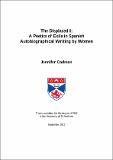Files in this item
The displaced I : a poetics of exile in Spanish autobiographical writing by women
Item metadata
| dc.contributor.advisor | Dennis, Nigel | |
| dc.contributor.advisor | Fernández Romero, Ricardo | |
| dc.contributor.author | Cadman, Jennifer | |
| dc.coverage.spatial | 288 | en_US |
| dc.date.accessioned | 2013-05-27T11:07:59Z | |
| dc.date.available | 2013-05-27T11:07:59Z | |
| dc.date.issued | 2013-06-27 | |
| dc.identifier | uk.bl.ethos.572734 | |
| dc.identifier.uri | https://hdl.handle.net/10023/3554 | |
| dc.description.abstract | Literary responses to Republican exile are diverse and autobiographical works have emerged as a significant modality of this exilic literature. Utilising poetics as a mode of inquiry, this thesis aims to examine some of the complex and nuanced ways in which exile has shaped autobiographical writing by both first and second-generation female exiles. To this end, I trace a poetics of exile in a selected corpus of nineteen autobiographical works by twelve authors: Constancia de la Mora, Isabel Oyarzábal de Palencia, Silvia Mistral, Clara Campoamor, Victoria Kent, Luisa Carnés, Remedios Oliva Berenguer, Francisca Muñoz Alday, Angelina Muñiz-Huberman, María Rosa Lojo, María Luisa Elío and Arantzazu Amezaga Iribarren. These texts were published across a seventy year period (1939 – 2009) in a number of geographical locations and written in a variety of circumstances. Exilic autobiographical texts are not homogeneous and relatively few have adhered to traditional models of autobiography. As such, the works examined are drawn from a variety of autobiographical sub-genres including propagandistic autobiographies, diaries, political essays, hybrid texts, autofiction, memoirs, childhood autobiographies, more experimental semi-autobiographical texts and a film. The main body of this thesis presents six aspects of a poetics of exile — the notion of the addressee, generic hybridization, polyphony, the propagation of collective memory, postmemory, and retroprogressive representations of childhood — and adopts a multi-disciplinary approach that draws upon a number of fields. This thesis aims to offer an illumination of the breadth and difference of women’s exilic autobiographical writing as highlighted in the identification of six very different aspects of a poetics of exile. | en_US |
| dc.language.iso | en | en_US |
| dc.publisher | University of St Andrews | |
| dc.subject | Exile | en_US |
| dc.subject | Autobiographical writing | en_US |
| dc.subject | Spanish Republican exile | en_US |
| dc.subject.lcc | PQ6055.C23 | |
| dc.subject.lcsh | Exiles' writings, Spanish | en_US |
| dc.subject.lcsh | Autobiography--Women authors | en_US |
| dc.subject.lcsh | Women authors, Spanish--History and criticism | en_US |
| dc.subject.lcsh | Exiled women authors | en_US |
| dc.title | The displaced I : a poetics of exile in Spanish autobiographical writing by women | en_US |
| dc.type | Thesis | en_US |
| dc.contributor.sponsor | Carnegie Trust for the Universities of Scotland | en_US |
| dc.type.qualificationlevel | Doctoral | en_US |
| dc.type.qualificationname | PhD Doctor of Philosophy | en_US |
| dc.publisher.institution | The University of St Andrews | en_US |
This item appears in the following Collection(s)
Items in the St Andrews Research Repository are protected by copyright, with all rights reserved, unless otherwise indicated.

